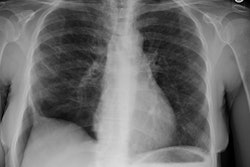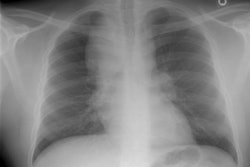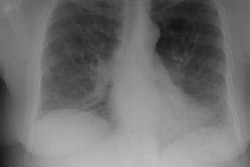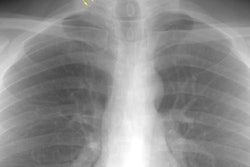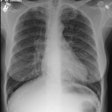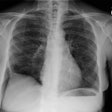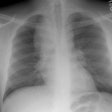AJR Am J Roentgenol 1997 Feb;168(2):351-355
Thoracic cross-sectional imaging of amyloidosis.Pickford HA, Swensen SJ, Utz JP
Department of Radiology, Mayo Clinic, Rochester, MN 55902, USA.
OBJECTIVE: Our objective was to determine the thoracic manifestations on cross-sectional imaging of patients with tissue-proven amyloidosis. MATERIALS AND METHODS: We reviewed the records of 300 patients with the diagnosis of amyloidosis on whom cross-sectional imaging was done at our institution between 1985 and 1995. After exclusions, 19 patients with tissue-proven amyloidosis and cervicothoracic cross-sectional imaging were included. Seven patients had localized amyloidosis and 12 patients had systemic amyloidosis. Eighteen patients underwent CT scans and the remaining patient, MR imaging. RESULTS: Two patients with systemic amyloidosis had widespread noncalcified adenopathy. A third patient had an infiltrative soft-tissue process in the mediastinum and axillae containing thick linear and focal calcifications. Five patients with localized amyloidosis had pulmonary nodules: Three patients had solitary nodules, one patient had two nodules, and one patient had 10 nodules. Nodules ranged in size from 8 mm to 3 cm. Eight patients with systemic amyloidosis had diffuse lung disease. One patient with systemic amyloidosis had recurrent right pleural effusions. Two patients with localized amyloidosis had laryngotracheobronchial amyloidosis. One of the two patients had focal thickening of the right aryepiglottic fold. The other patient had diffuse concentric soft-tissue thickening within the trachea.
CONCLUSIONS: Localized amyloidosis can occur in patients as pulmonary nodules or as laryngotracheobronchia involvement. Nodules are typically solitary (60%) with a smooth or lobular contour and are frequently in a subpleural or peripheral location. Calcification is not common (20%). Systemic amyloidosis can occur in patients as a combination of adenopathy (75%), multiple pulmonary nodules (50%), and diffuse irregular lines or interlobular septal thickening (50%).
PMID: 9016204, MUID: 97168611
